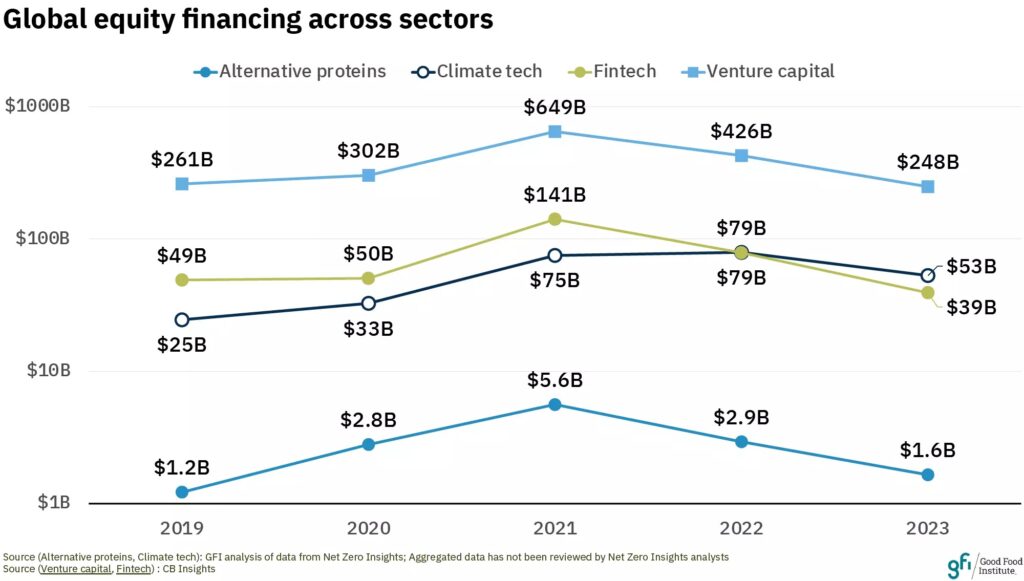Cultivated Meat Startup Aleph Farms Lays Off 30% of Staff As Part of ‘Asset-Light’ Growth Strategy
5 Mins Read
Israeli cultivated meat producer Aleph Farms has let go of 30% of its domestic workforce, reportedly due to difficulties in securing capital amid its scale-up process.
Aleph Farms, one of only four companies cleared to sell cultivated meat, has laid off about 30 of its 100 local employees, owing to difficulties in raising capital amid a wider investment decline in the sector, according to Israeli food tech publication CTech.
An Aleph Farms spokesperson confirmed the news. “As we transition towards larger-scale production and commercialisation, we are maintaining R&D and production in Israel while expanding globally through co-manufacturers, in line with our capital-efficient and asset-light approach,” they told Green Queen.
“We are adapting our organisation to align with this next growth phase, and need to part ways with approximately 30% of our local employees. We care for all affected employees and will be supporting them in the new job search.”
Aleph Farms had ‘expected significant expansion’ this year

Around the same time CTech reported the news last night, Aleph Farms posted an update on social media. “The ability to adapt is fundamental at all levels of life, enabling us to navigate change and foster growth over time,” it read. It’s unclear whether this was in reference to the restructuring, but it did mark a departure from the style of its other posts.
Aleph Farms started the year with the biggest milestone in its seven-year history, earning regulatory approval to sell its cultivated beef in Israel. The startup had announced its intention to roll out its Black Angus Petit Steak under the Aleph Cuts brand at select restaurants in the country, with a longer-term goal of making it available to retailers.
Since then, it has struck a deal to produce cultivated meat in Thailand, and partnered with a biotech startup to leverage AI to reduce costs and enable scalability. These advancements followed the 2022 opening of its 65,000 sq ft plant in Rehovot, Israel, allowing it to initially produce 10 tonnes of cultivated steak annually, the acquisition of another manufacturing facility in Modi’in, as well as the agreement with ESCO Aster in Singapore (the world’s first approved industrial manufacturer for cultivated meat).
The company has previously outlined its aim to reach $1B in revenue by 2030, and has so far raised $118M in funding. Its last investment round was in 2022, bringing in a sizeable Series B amount of $105M. But struggles in securing investment, the global decrease in alternative protein funding, and the geopolitical tension with the Israel-Hamas war have put pressure on the company, according to CTech.
The publication cited strategic plans and investor promises to suggest that Aleph Farms had hoped for a different year. One industry insider was quoted as saying: “They expected a very significant expansion this year, but the situation in Israel is difficult for the entire market. All companies are reexamining their expenses.”
Israel’s alternative protein challenges – and potential

Alternative protein investments saw a marked downturn in 2023, among a wider VC fallout from food tech. According to the Good Food Institute (GFI), food tech companies received 61% fewer VC dollars last year than in 2022, while alternative protein funding dropped by 44% to $1.6B.
Cultivated meat companies were hit especially hard, with investment down by 75% from 2022. And this loss of faith among VCs has continued, with the first quarter of 2024 seeing merely 5% of the $226M invested in the sector in all of last year. It’s why AgFunder has earmarked cultivated meat as a “category to watch” this year.
Within Israel, VC fundraising was down by 74% in 2023, hitting an eight-year low. Coupled with the struggles of the fintech sector, several other startups have been forced to make cutbacks in their workforce.
That said, despite a dip in alternative protein financing, interest in the industry remains strong in Israel. The country was responsible for 10% of the sector’s investments globally in the last decade, second only to the US, according to a recent report. Last year, a record 15 new startups began working on novel proteins, taking the total to 73. And in 2022, the Israeli Innovation Authority (IIA) established an $18M research consortium for cultivated meat, comprising 14 companies and 10 academic laboratories.

The analysis also outlined the industry’s long-term potential, forecasting that it will generate 10,000 additional jobs (a third of which would be manufacturing roles), have more than 200 companies and over a dozen manufacturing facilities, and contribute $2.5B to Israel’s economy by 2030. The report’s authors encouraged investors to take confidence in the IIA’s efforts and pump significant capital into the sector
But as Aleph Farms pointed out, challenges remain, especially for companies trying to expand their production capacity. “Scaling up manufacturing for Israeli startups is challenging due to infrastructure costs, mirroring challenges encountered by startups worldwide,” Alla Voldman, VP of strategy and policy at GFI Israel, told Green Queen last month.
She added that the geopolitical situation is heartbreaking. “However, the Israeli entrepreneurs proved their resilience in ensuring their companies meet the milestones,” she said. “We believe that the increasing need for food security solutions locally and across the globe will drive additional private and public investments in this sector toward innovative technological solutions.”



